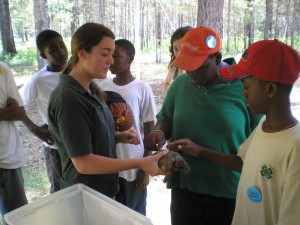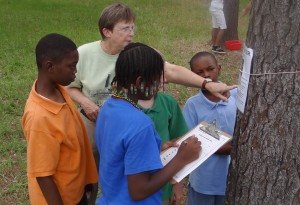by Niki Crawson | Mar 29, 2013
Spring and summer seasons can seem like a busier time than normal for 4-H volunteers. Between 4-H/Tropicana, shooting sports matches, volunteer trainings and upcoming summer day camps, 4-H becomes a world of its own with wonderful youth development opportunities to teach needed life skills to our youth. However, with the busy season approaching, concern of the dreaded VOLUNTEER BURNOUT is real. It typically rears its ugly head starting in April and really takes a hold by June. By July, it has claimed more volunteer victims than we like to admit. It is dark, ugly, and heavy. It preys on the unsuspecting, the tired, the unselfish.

Do you feel the burn?
What causes volunteer burnout, and how does one recognize it before it attacks? Volunteer burnout can be a result of one or more factors such as over commitment, lack of sufficient breaks and rest, excessive responsibilities, an inability to say “no” and so on. Volunteer burnout will typically prey on the loyal, unselfish, dedicated volunteer who wants to make a difference but may do so too much, too fast, and/or too often. The only way to avoid volunteer burnout is to…take time for YOU.
“Wait, what? Take time for myself? But what about the youth I am positively impacting through 4-H?” you may ask. Well, the old saying “you cannot help others if you are not taking care of yourself first” applies here. In order for this to occur, you have to tend to yourself and have a healthy balance established between your needs, your family, work, etc.
If you are concerned that you are starting to feel the effects of volunteer burnout, talk to your 4-H Agent immediately. Find out what can be done to help you ease the burden you are feeling. Sometimes, it is a simple solution of talking through your concerns and frustrations regarding your schedule and setting priorities and new boundaries. Other times it may mean getting more sleep, exercise, or starting a hobby that relaxes you. Then again, sometimes it may require that more drastic measures be implemented such as giving up a task, learning to say “no” more often or even taking a few weeks off from your volunteer duties to tend to your own needs by enjoying the beautiful weather and working in your garden.
So, before you let the nasty volunteer burnout monster bite and send you running from the wonderful 4-H program you are involved in, we urge you to maintain a healthy balance between dedicated and delirious. Take time for yourself. Eat healthy. Exercise regularly. Spend quality time with family and friends. Enjoy the spring days. Visit the UF IFAS EDIS website (http://edis.ifas.ufl.edu/) for fantastic gardening tips. Remember that you have the 4-H family in your corner supporting you 100% in your need for a little “you” time!
by Marcus Boston Jr. | Mar 15, 2013

Youth learn about the habitat and calm nature of the Gopher Tortoise at the 4-H Wildiife and Outdoor Recreation Camp
Many youth today are suffering from a serious, preventable disorder that is the result of early age experiences and if not properly diagnosed or treated, may cause severe mental health issues up through adulthood. This disorder I’m referring to is called Videophilia. Videophilia can be described as the love of any form of electronic media. This media may be internet, movies, video games, cell phones, or just plain TV. Many youth are so attached to their video devices that they hardly ever go outside to see what’s going on in the natural world. In Richard Louv’s book “Last Child in the Woods” he calls this condition “Nature-Deficit Disorder”.
According to the Center for Environmental Health, consistent contact with nature has many health benefits including helping to ease attention-deficit disorder, aiding in cognitive development, enhancing creativity, and reducing stress. With so much emphasis on our communities becoming more sustainable in how they utilize resources, many environmentalist fear that the loss of contact with nature will weaken Americans commitments to conservation and biodiversity. These concepts will have more impact to the future of our world if they are introduced to youth as they matriculate through grade school. The earlier we teach them how to enjoy the great outdoors the better!
What is nature you may ask?? Nature can be Yellowstone National Park, The Appalachia National Forest, or it could be a clump of trees at the back of a neighborhood or in someone’s yard. To the scientific eye the clump of trees might not look like much but to a child it could be a life changing experience. Every 4-H club agenda that is developed should include a nature walk or some other outdoor activity. Additionally, 4-H residential and day camps provide perfect opportunities for both youth and adults to explore the great outdoors together. Most electronic programs and activities only require hearing and seeing, however providing an outdoor experience for 4-H youth will provide opportunities to hear, smell, touch, see and sometimes taste. Nature Deficit Disorder may be a growing disorder, but lucky for us, with programs like 4-H and great volunteers, it is a disorder that can be easily cured!
by jgl1 | Mar 1, 2013

“Our 4-H volunteers strive to provide a positive learning experience for all youth, reassuring parents that their children are in safe and nurturing environments, but what do you do when you recognize child abuse? How do you deal with it?”
As members of a youth serving organization it is important that adults are aware of their responsibility for child safety. Our hope is that all children will live in a safe environment, but we know that children are exposed to neglect and abuse. We have a responsibility to educate ourselves and the children with whom we work about the risks to the welfare of a child. It is mandated by law as a volunteer with the Florida Cooperative Extension Service that you must report suspected child abuse cases to your Florida Department of Children and Families. (more…)



